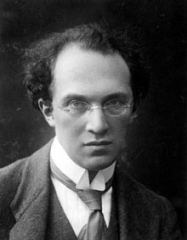On the occasion of the opening of the exhibition “verfemt, verfolgt – vergessen? Kunst und Künstler im Nationalsozialismus”1 the chamber symphonic orchestra Kammersymphonie Berlin, conducted by Jürgen Bruns, will play the concert Verehrt – verfemt – versunken2 at Nikolaikirche (St. Nicholas Church), Berlin’s oldest church. The concert consists of worky by Franz Schreker, Gideon Klein, Erich Zeisl, Egon Wellesz and Pavel Haas. They ranked as the most revered composers of their times, but due to Nazi persecution and murder, they vanished into oblivion. Both the concert and the exhibition are part of the theme year “Diversity Destroyed”.

The Austrian Franz Schreker (1878-1934) was one of the most popular composers of his time. But already in the 1920s, Schreker was attacked by the Nazis. Shortly after his forced retirement, he died of an heart attack.
Quite early, the extraordinary talent of Gideon Klein (1919-1945) was noticed: with just 14 years, he gave his first concert, four years after his first compositions. After the annexation of Czechoslovakia by Germany, he was banned from any further performances. In 1941, he was deported to KZ Theresienstadt, where he continued to compose. Nine days after completing his String Trio in October 1944, he was taken to KZ Auschwitz, where he died just a few days before the concentration camp’s liberation under cloudy circumstances.
After the “Anschluss” of Austria to Germany in 1938, the Austrian composer Erich Zeisl (1905-1959) emigrated to Paris and later to the USA. A melancholic theme cannot only be heared in his countless airs.
Equally born in Austria, the composer and musicologist Egon Wellesz (1885-1974) had to emigrate in 1938, too; he chose the route via Amsterdam to the United Kingdom. In 1940, like many other emigrants of German or Austrian origin, he was interned as “enemy alien” for a few months on the Isle of Man; in 1946, he was finally granted British citizenship.
The successful opera Šarlatán (the charlatan) by Czech composer Pavel Haas (1899-1944) was banned shortly after the annexation of Czechoslovakia by Germany, together with his other music. In 1940, he divorced himself from his wife to protect her life and that of their common daughter from further persecution. Deported to KZ Theresienstadt in 1941, he was animated by Gideon Klein to continue his musical work. To present the concentration camp as a “showpiece ghetto”, Haas was allowed to let his “Study for String Orchestra” being premièred on 23 June 1944 to members of the International Committee of the Red Cross (ICRC). After this propaganda move, however, all cultural life was banned in the camp and many artists, including Haas, were deported to KZ Auschwitz on 16 October 1944, where he was murdered the following day. Only three of his at least eight compositions made during those years could be saved.
Verehrt – verfemt – versunken
Concert by Kammersymphonie Berlin
14 March 2013, 2000h (admission from 1930h)
Admission: 18,- € (concessions: 10,- €)
Franz Schreker: Intermezzo
Gideon Klein: Partita for Strings
Erich Zeisl: Variations on a Slovak Theme
Egib Wellesz: Music for String Orchestra in One Movement
Pavel Haas: Study for String Orchestra
Nikolaikirche/St. Nicholas Church
Nikolaikirchplatz
10178 Berlin
Germany
